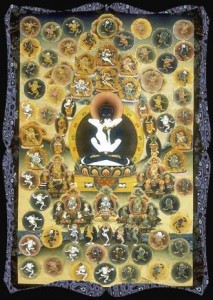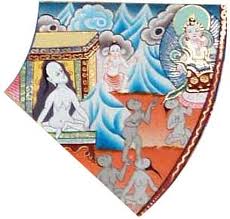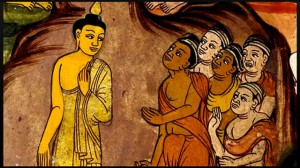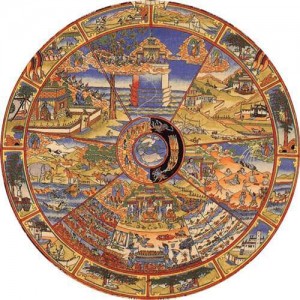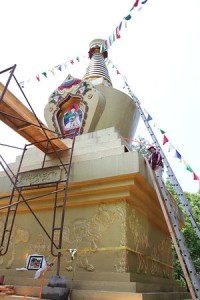The following is an excerpt from a teaching by Jetsunma Ahkon Lhamo offered during a Phowa retreat:
In the general sense, it is said that there are six bardos. There is the bardo of living, which is the bardo of birth to death. Bokar Rinpoche says, “…the bardo of birth to death, which ceases as soon as the first signs of the agony of death start.” And I have also heard that once one knows that one is dying, once one catches the disease that will ultimately cause the death, then you are in a different bardo, actually, than the bardo of living—although technically it still is part of the bardo of living. It is called the bardo of preparation, or the bardo before death. There is a passage of time that precedes the time of death once you have caught or have experienced the problem that will end your life. But this lama says, “…when the first signs of the agony of death start.”
There is the bardo of the dream state, which is delineated by the moment we fall asleep and the moment we wake up. So each time we sleep and dream, that is a bardo, and there is a beginning and an end. There is a passage within that; and there are cause and effect relationships that are begun and also ripen within that bardo.
There is the bardo of meditative concentration. I’ve also heard it called the bardo of meditation, and the bardo of concentration. And that lasts from the beginning to the end of a meditation or concentration. Meditation in Dharma, or concentration such as vipassana practice, or shamata practice, simply silent meditation is so profoundly different from our normal waking consciousness that it deserves its own name. It is a different passage. It has a beginning time and an end time. It has its own causes and results that occur within the context of that passage according to how one conducts oneself during that passage. How do you meditate? Do you meditate really putting yourself into it? Do you meditate in a haphazard way? These kinds of things. So that is a bardo.
There is the bardo of the moment of death, and here he says, “…which commences when the death process begins and which lasts until actual death.” And there it’s more clear, because in truth, if you have already caught the disease that will ultimately cause your death, then in that case you have already literally begun the process of death. Another way to look at it is the moment you stop growing, once you start aging, you have also begun the process of death, you see. That’s true. Once the body stops growing and begins to go on the downside of that (which mine has definitely started to do, I can tell), there is another bardo involved in that. While technically still part of the bardo of living, it is the bardo of the moment of death as well. It is a contributing factor to that. More succinctly and more clearly, it is generally said that the bardo of the moment of death begins when the death process has actually begun.
There is the bardo of Dharmata, which starts when death occurs and lasts until the deities appear in the postmortem state. That will be explained in detail later on. We will talk about the moment of the perception of the white luminosity, the moment of the perception of the red luminosity, the moment of the perception of the clear or black luminosity. The bardo of Dharmata that we are talking about here actually begins during the moment of the recognition or the perception or the appearance of the black or clear luminosity. That is when the external breath has ceased and the internal wind has just begun to cease, is just now ceasing. At that moment, that is the bardo of Dharmata. The elements have already begun to dissolve. In some cases they are dissolved, and in other cases they are continuing to dissolve, but they are at that critical point where there is a final dissolution. At that point one will see the nature of the Dharmata. However, an inexperienced practitioner will not recognize it, and they will go through what in death is thought of as a fainting or dark period. Everyone who is not experienced in meditation will experience that, because they do not recognize the face of the Dharmata, or that light which is clear but may appear as black. So this particular passage, the bardo of Dharmata, then starts when the outer breath has ceased. The inner wind still continues to some degree, from that point on, until the moment when the deities appear. And we will talk about when the deities appear.
After the bardo of Dharmata, and this is considering that one has not yet liberated one’s self from the bardo, the next bardo is the bardo of becoming, which starts when the previous bardo ceases..That’s the bardo that ceases when the deities appear and ends when we are born. Now the bardo of becoming absolutely indicates that once you have reached it, you will be reborn in cyclic existence. There is no help for it. You will be reborn in cyclic existence. But even during that time you can create the causes of liberation that will cause you to be reborn in a different way than what you are now—a more realized, more enlightened way. it is particularly possible during the bardo of becoming to absolutely ensure that your next life will be associated with Dharma, will lead directly toward liberation, will be correct in bringing you to the Path, and will be without flaw in that regard.
So these are generally the six bardos. But remember that there’s not only six. There can be, depending on how you view things, uncountable bardos, because bardos are passages. And it is the delusion that we are passing through something that makes the bardo seem like a limited space and a limited time. But in fact, it is simply movement and display. The lama here puts it in this way, “The essence of the mind of all beings is called the essence of awakening. From this point of view, which is that of ultimate truth, there is no bardo. We know nothing of the ultimate nature of the mind, and that is why all sorts of illusory manifestations occur in the relative mode. Among these there are the six bardos that cause much suffering. Buddhist teachings intend to dispel such erroneous experiences and their resultant sufferings.” So what we are looking at here is that from the relative point of view and in the deluded state, this is what appears and this is what we must deal with. In the same way that you’re here, you’re alive, and you have to cope with that. In the same way, these are the experiences. These are what we have to deal with. Yet, from the point of view of realization, there is no such thing because there is no subjective and objective. It is only our delusion that causes us to see in this way. And so, characteristic of having that delusion and being trapped in that delusion, we actually have to study the delusion and learn about the delusion so that we can negotiate through the delusion into awakening. And that is how we have to view these time periods, these bardo movements.
He says also, and I think this is an important point to bring out: “The six bardos are not six domains existing independently within ourselves.” And, of course, that is how we think, isn’t it? ‘When will I get to that bardo over there?’ That’s how we think because of our delusion. “They are related to our mind, which lives in a state of delusion” at this point. He doesn’t say ‘at this point.’ I’m adding that. “The six bardos manifest out of our mind. It is our mind that has the experience, and it is our mind that recognizes their false nature. And eventually it will be our mind that liberates us from the very products of the mind.”
Copyright © Jetsunma Ahkon Norbu Lhamo All rights reserved
